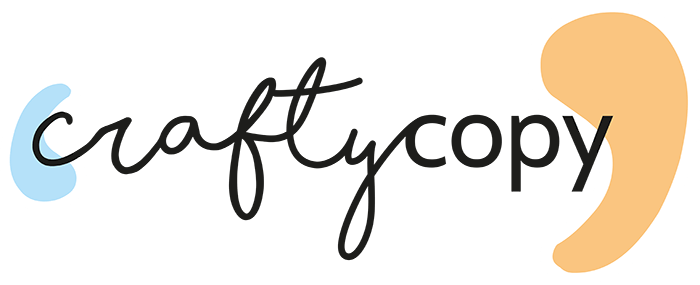Why Become an Audience-Oriented Business (It’s NOT About You)
As an SEO copywriter and content writer, I’ve been writing website copy and blog posts on all sorts of topics and industries but, as of this year, for one type of client: audience-oriented small businesses.
The kind of small businesses with the potential to go BIG in the eyes of their target market.
Lemme explain what audience-oriented marketing means real quick, and then I’ll show you how adopting this approach will improve your business dramatically and help you grow.
Let’s start with an example: business A or business B?
Say you’ve always bought fast fashion products and, after discovering the horrors behind this industry, you decide to look for your first sustainable t-shirts.
You open business A’s website and are met with this message:
“We’re an award-winning company with eleven years of experience in the sustainable fashion industry, and we’re excited to introduce you to our new collection of ethical t-shirts.
Each product is made with GOTS-certified cotton and based on the ambitious vision of our creative team of designers.”
Then you open business B’s website:
“Do you keep promising yourself that you’ll take the first step towards sustainable fashion but are not sure where to start? Start here!
Each of our organic cotton t-shirts is unique yet versatile, perfect to create several outfits with what you already have in your wardrobe. Nice one!”
Which one sparks an epiphany and makes you think that they know exactly what you need: business A or business B?
Yep, business B’s website, right?
Your first impression doesn’t need to be about a company’s experience or mission, and let’s be honest: you couldn’t care less about whether or not they’re excited about something.
Company B, on the contrary, spoke to you directly.
They didn’t waste time by blowing their own trumpet, throwing difficult jargon at you, or describing vague product features: they told you exactly how their product can solve your pain point.
“But the other t-shirts can be versatile and do the exact same thing!”
Probably. But the company hasn’t bothered telling you that.
And you know what? You might not have consciously known what your pain point was to begin with, which is why leaving it as an implicit message wouldn’t have worked.
That’s what an audience-oriented business or copywriter can do: they identify the problem that was in the back of their customers’ heads but that they couldn’t quite figure out, and then they show them exactly how their product can solve it and benefit them.
So, what’s an audience-oriented approach in marketing?
In marketing, an audience-oriented approach means putting your target customers first, focusing on how your business, product or service can help THEM.
Basically, instead of boring them by telling them why you’re the best and your product is great, you focus on why you and your product are the best for a specific type of customer and on what you can do for them.
Less bragging (sorry!), more value.
Why choose an audience-oriented approach as a small business
Because new potential customers don’t give a crap about you. Again, sorry to break it to you, but that’s how the world works, unfortunately.
And… honestly? When you accept that they don’t give a damn about your company, that’s the turning point. That’s what you need to do in order to set yourself up for success.
This is because your potential customers only care about what you can do for them, and let’s be real: can you really blame them?
Even if you’re currently wearing your CEO, manager, or entrepreneur hat, put it down for a moment and think of yourself as a customer.
From the moment you wake up and look at your phone to when you watch TV before going to bed, you’re bombarded with ads and all kinds of businesses telling us to buy their products.
You can’t (and have no reason to) care about all of them!
However, if a business were to tell you about how they’ve got a solution to that problem that’s been nagging you for ages, of course, they’d have your attention.
So, the reason to become an audience-oriented business is to stand out against your competitors, grab your prospects’ attention before they bounce out of your website, stop them from pressing that ‘unfollow’ button on your social media… and win over and retain your target audience, basically!
To win the marketing game, we could say.
How to become an audience-oriented business
Ready to revamp your website and marketing strategy with an audience-oriented approach?
First of all, start by reminding yourself who your specific target audience is. If you’ve never bothered researching it because ‘your product is perfect for everyone’, think again!
Then, identify what problems your product or service can solve for them. Does it save them time? Money? Does it help them live more comfortably?
These are just general ideas: you should try and be as specific as you can.
For example, my blog writing services help small businesses go BIG in their target audience’s eyes by offering them insightful and valuable content while also generating more traffic through search engines, smoothening the sales funnel, and turning more visitors into leads and customers.
Once this is all clear for you, here’s how to actively become an audience-oriented business.
1. Create a social media strategy based on your dream customers
Is your feed all about your awards and how great you are? You might want to move that to your personal Facebook (I’m sure your mum and aunt will love to know).
As for your business profiles, only 20% of your content should be promotional! (1). The rest? Posts that bring value to your target audience, either by informing them or entertaining them… or both at the same time, when you can.
Talk about things they care about, give them tips, solve their problems, and have an actual conversation with them.
2. Turn your newsletter into a personalised email marketing strategy
Your newsletter shouldn’t be a newsletter. It should be an email marketing strategy.
You know what? Maybe it shouldn’t even have ‘newsletter’ in its title as that could deter users from signing up or prompt them to unsubscribe after receiving it (2). Shocking, right?
Don’t just send them boring updates about your company. Talk to your subscribers about issues that you know they’re interested in, ask questions, answer theirs, and give value.
3. Make sure your website copy tells your customers how you can help them
As you’ve probably noticed with our initial business A/business B comparison, your website copy can make all the difference.
You have around 8 seconds to impress whoever lands on it. Are you really going to waste that time by immediately telling them aaaaaaaaall about yourself?
For an audience-oriented website, remind your dream customers what their pain point is when it comes to your industry and show them how you can solve it.
Make sure they understand that you created your products or services with them in mind.
4. Blog to offer them valuable content to your target audience
Have you got a blog section on your business website? I hope you do, since there are so many blogging benefits!
However, you’re most definitely NOT going to unlock them by blogging about your company’s achievements.
Sure, you can occasionally announce something special or show some behind the scenes to humanise your brand, but your blogging strategy shouldn’t be about you.
If you want to be an audience-oriented business, it should be about topics that your customers care about, as long as they’re tied to your industry and products.
Answer questions, create informational ‘how-to’ articles, and clarify their doubts while targeting the right long-tail keywords.
This will also help you showcase your expertise and give you more content to post on your social media and ‘newsletter’ (double win).
How I help audience-oriented small businesses
I have two core services that can help you position yourself as an audience-oriented business and start attracting the right customers:
Website copywriting: I’ll make sure that your web pages instantly capture your dream customers’ attention and show them why your product or services are the best thing that has ever happened to them;
Blog writing: I’ll help you reach and retain a much wider portion of your target audience, rank higher on search engines, stand out against your competitors, and smoothen the sales funnel
More #crafty blog posts on this topic:
References
Hall, T. (2020, October 6). The New 80/20 Rule of Social Media Marketing. Retrieved from https://www.inc.com/sophie-downes/remote-work-home-ergonomics-stress-back-pain-health.html
Silva, P. (2018, April 11). Why Newsletters Suck And How To Do Successful Email Marketing. Retrieved from https://www.forbes.com/sites/piasilva/2018/04/11/why-newsletters-suck-and-how-to-do-successful-email-marketing/#45b366820abd














